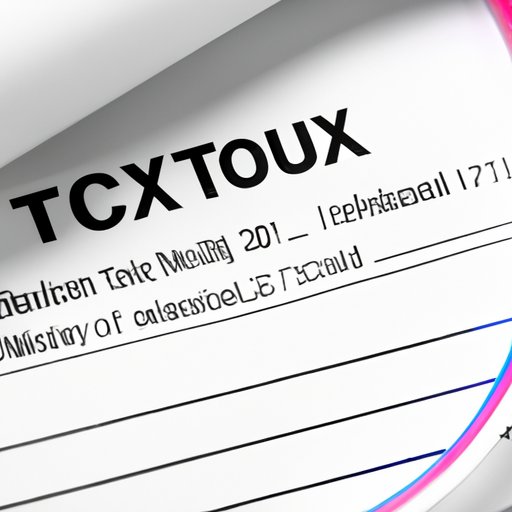Introduction
Tax credits are government incentives designed to reduce the amount of taxes owed by individuals and businesses. It’s important to understand how tax credits work in order to maximize your refund or lower your tax liability.
Explaining the Tax Credit Process Step-by-Step
The process of calculating and claiming tax credits begins with filing your tax return. Depending on the type of tax credit available, you may need to provide additional documents to prove your eligibility. Once your return is filed, you can begin the process of calculating your tax liability.
To calculate your tax liability, you must add up all of your taxable income for the year, subtract any deductions or exemptions, and then use your tax bracket to determine how much tax you owe. After you have calculated your tax liability, you can begin to claim tax credits.
When claiming tax credits, you must first determine which credits are applicable to you. Each credit has its own qualifications, so it’s important to research each one carefully in order to make sure you qualify. Once you have determined which credits you qualify for, you can calculate the amount of credit due to you.
After you have calculated the amount of credit due to you, you can subtract it from your total tax liability. This will result in your final tax bill. If the amount of credit exceeds your tax liability, you may be eligible for a refund.

Examining How Tax Credits Affect Your Tax Bill
Tax credits can significantly reduce your tax liability or increase your refund. By claiming tax credits, you can reduce the amount of taxes owed or receive a larger refund than you otherwise would.
Lowering Your Tax Liability
If you’re able to claim enough tax credits, you may be able to reduce your tax liability to zero. This means that you won’t owe any taxes for the year. This can be especially beneficial if you’re expecting a large tax bill due to high income or other factors.
Increasing Your Refund
Tax credits can also increase the size of your refund. If your total tax liability is less than the amount of tax credits claimed, you may be eligible for a refund. The size of the refund will depend on the amount of tax credits claimed.
Common Types of Tax Credits and Who Qualifies
There are several types of tax credits available depending on your situation. Here are some of the most common tax credits and who qualifies for them:
Child Tax Credit
The child tax credit is available to those who have dependent children under the age of 17. The amount of credit varies based on the number of children and their ages. Generally, the credit is worth up to $2,000 per child.
Earned Income Tax Credit
The earned income tax credit is available to those with low to moderate incomes. The amount of credit varies based on income and the number of qualifying children. Generally, the credit is worth up to $6,660.
Education Tax Credit
The education tax credit is available to those who are enrolled in college or other post-secondary educational programs. The amount of credit varies based on expenses and income. Generally, the credit is worth up to $2,500.
Retirement Savings Contribution Credit
The retirement savings contribution credit is available to those who contribute to a qualified retirement plan. The amount of credit varies based on contributions and income. Generally, the credit is worth up to $1,000.

Pros and Cons of Claiming Tax Credits
Claiming tax credits can be beneficial, but there are also some risks associated with them. Here are some of the pros and cons of claiming tax credits:
Benefits of Tax Credits
The primary benefit of claiming tax credits is that they can reduce your tax liability or increase your refund. This can be especially helpful if you’re expecting a large tax bill or hoping to get a bigger refund. Additionally, some credits may be refundable, meaning you can get the full value of the credit even if it exceeds your tax liability.
Risks of Tax Credits
One of the risks associated with claiming tax credits is that you may not be eligible for them. If this happens, you may end up owing more taxes than you had anticipated. Additionally, claiming certain credits may subject you to an audit or other penalties. It’s important to research each credit carefully before claiming it to ensure that you’re eligible.

Strategies to Maximize Your Tax Credits
There are several strategies you can use to maximize your tax credits. Here are some tips to help you get the most out of your credits:
Utilizing Multiple Tax Credits
One of the best ways to maximize your tax credits is to utilize multiple credits. For example, if you’re eligible for both the child tax credit and the earned income tax credit, you can claim both in order to get the maximum benefit.
Keeping Track of Tax Credits
It’s important to keep track of the tax credits you’ve claimed in order to ensure that you don’t exceed the limit for any particular credit. For example, if you’ve already claimed the maximum amount of the child tax credit, you won’t be able to claim any more.
Utilizing Tax Preparation Software
Using tax preparation software can help you maximize your tax credits. The software can help you identify which credits you’re eligible for and calculate the amount of credit due to you. This can save you time and ensure that you get the maximum benefit from your credits.
Conclusion
Tax credits are a great way to reduce your tax liability or increase your refund. It’s important to understand how tax credits work in order to maximize your benefit. By utilizing multiple credits, keeping track of your credits, and utilizing tax preparation software, you can maximize your tax credits and get the most out of them.
(Note: Is this article not meeting your expectations? Do you have knowledge or insights to share? Unlock new opportunities and expand your reach by joining our authors team. Click Registration to join us and share your expertise with our readers.)
